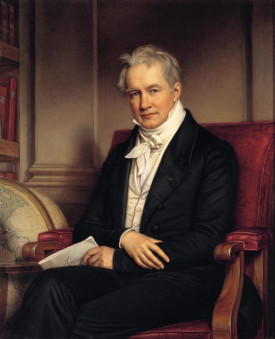A Colloquium Celebrating Alexander von Humboldt’s 250th Birthday
 FHS hosted a colloquium commemorating Alexander von Humboldt’s 250th birthday. The colloquium brought together many of the world's leading Humboldt scholars for a two-day event on Nov. 1 & 2, 2019.
FHS hosted a colloquium commemorating Alexander von Humboldt’s 250th birthday. The colloquium brought together many of the world's leading Humboldt scholars for a two-day event on Nov. 1 & 2, 2019.
Born in Prussia, Humboldt’s restless life was packed with adventure and discovery on three continents, whether climbing the highest volcanoes in the world, paddling down the Orinoco River, or racing through anthrax-infested Siberia. Perceiving nature as an interconnected global force ("the web of life"), Humboldt discovered similarities between climate zones across the world and predicted human-induced climate change. He turned scientific observation into poetic narrative, writing books that were best-sellers in several languages that influenced politics, evolution, ecology, conservation, art, and literature. He inspired naturalists and poets such as Darwin, Wordsworth, and Goethe but also politicians such as Thomas Jefferson and Simón Bolívar. Famous, beloved, and respected in his lifetime, nations on three continents named universities, cities, and geographic features in his honor. He still remains well-known if not revered in Europe and Central and South America, but has largely been forgotten in the United States—this in spite of numerous cities, counties, mountains, and rivers bearing his name.
The colloquium explored the many facets of Humboldt's work, influences, and legacy. Presenters included:
- Stephen Bell, Department of Geography, UCLA (A Life in Shadow: Aimé Bonpland in Southern South America)
- Stephen Jackson, U.S. Geological Survey and University of Arizona (editor, Humboldt’s Essay on the Geography of Plants, and co-editor with Laura Dassow Walls of Humboldt’s Ansichten der Nature)
- Elizabeth Millán, Department of Philosophy, DePaul University (The Romantic Roots of Alexander von Humboldt’s Presentation of Nature)
- Nicolaas Rupke, Institut fűr Wissenschaftsgeschichte, Universität Göttingen (Alexander von Humboldt: A Metabiography)
- Laura Dassow Walls, English Department at Notre Dame (Passage to Cosmos: Alexander von Humboldt and the Shaping of America)
The entire event was streamed live on our YouTube channel.
Sponsors: Bass Connections at Duke University, Forest History Society, Duke Center for Interdisciplinary Studies in Science and Cultural Theory, Duke’s Nicholas School of the Environment, Duke’s Department of History, the Franklin Humanities Institute, and the National Humanities Center.

